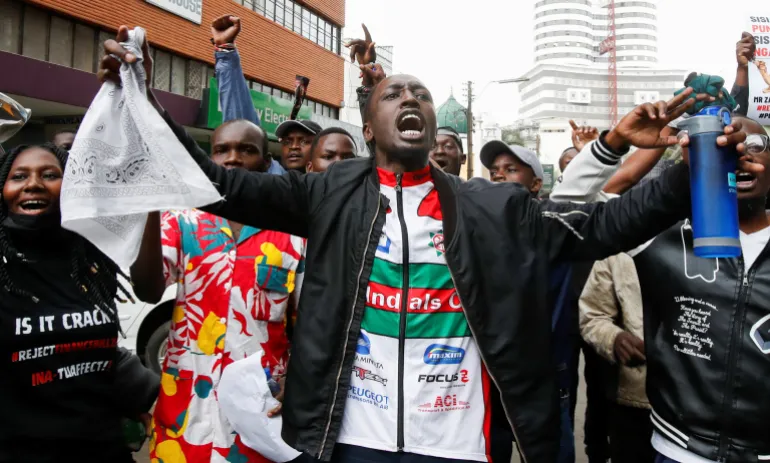In recent uproars in Kenya, a social media campaign has exploded into weeks of violent protests led by the country’s Gen Z population, leaving over 23 people dead and government buildings in flames.
The unrest stems from widespread opposition to the proposed Finance Bill 2024, which seeks to implement tax hikes to address Kenya’s mounting budget deficit.
Despite amendments to the bill, protesters remain steadfast in their demand for its complete withdrawal, citing the severe economic impact on millions of impoverished citizens.
In an exclusive interview with The Vaultz News, Gabriel Oguda, a prominent social media commentator on X, provided his opinion on the factors driving the protests and the broader socio-economic and political issues at play.
A Crisis of Trust and Governance
When asked why the government’s amendments to the Finance Bill 2024 have failed to quell the protests, Oguda pointed to a deep-seated crisis of trust.
“Ruto has lied too many times to Kenyans, and even if he doesn’t sign the bill, he will sneak something in the future,” Oguda explained.
“The amendments haven’t addressed the root issues, and people from low-income backgrounds continue to suffer. The government has failed to show genuine commitment to the welfare of its citizens.”
Gabriel Oguda
This sentiment reflects a broader dissatisfaction with the Kenyan government’s handling of economic policies and a perceived lack of transparency and accountability.
The Finance Bill, which aims to increase taxes, has been seen as an additional burden on a population already struggling with high unemployment and economic instability.
Deeper Socio-Economic and Political Grievances
Oguda emphasized that the protests are not solely about the Finance Bill. “Beyond the Finance Bill, the youth are driven by deeper socio-economic and political grievances. Unemployment, corruption, and inequality have left many feeling their future is slipping away right before their eyes,” he said.
“The lack of opportunities and systemic corruption have done a lot of damage to this country.”
The Gen Z-led protests reflect a broader frustration with systemic issues that have plagued Kenya for years. High unemployment rates, particularly among the youth, coupled with widespread corruption and social inequality, have created a volatile environment where the younger generation feels disenfranchised and disillusioned.
Government’s Heavy-Handed Response
The government’s response to the protests has been marked by heavy-handed tactics, leading to numerous human rights violations. “The police were just brutal, gassing us to death, with live bullets, abductions, beatings, and others—all because we are calling for a better life,” Oguda recounted.
“But I have to say the judiciary and lawyers did a great job calling for all those arrested to be released.”
Oguda’s account highlights the stark contrast between the government’s violent suppression of the protests and the efforts of the judiciary and legal community to uphold civil liberties. The handling of the protests has raised significant concerns about the future of democracy and human rights in Kenya.
Fiscal Strategies and Political Implications
Given Kenya’s high public debt and reliance on IMF assistance, Oguda suggests that tackling corruption is crucial for any viable fiscal strategy. “If we fight the problem of corruption in governance, half of our problem is solved,” he stated.
“This country can generate all the revenues, but it will end up in people’s offshore accounts. We are not against taxes but there is no accountability. Let’s start there.”
Gabriel Oguda
Oguda’s remarks underscore the need for greater accountability and transparency in government as essential steps toward economic stability.
The Future of Kenyan Politics
The protests have also called for the resignation of President Ruto, a demand that could have significant implications for Kenya’s political future.

“If the government fails to address the demands of the people, it risks further instability and loss of legitimacy,” Oguda warned.
“This unrest may inspire a stronger push for political reforms and greater accountability. The future of Kenyan politics could see increased activism and a demand for leaders who prioritize the needs and rights of the people over personal gain.”
Gabriel Oguda
As such the demands for justice, accountability, and genuine economic reform are not just the cries of a discontented youth but a reflection of a nation at a critical crossroads.
READ ALSO: Labour To Replace NHS England Chair With Party Loyalist





















